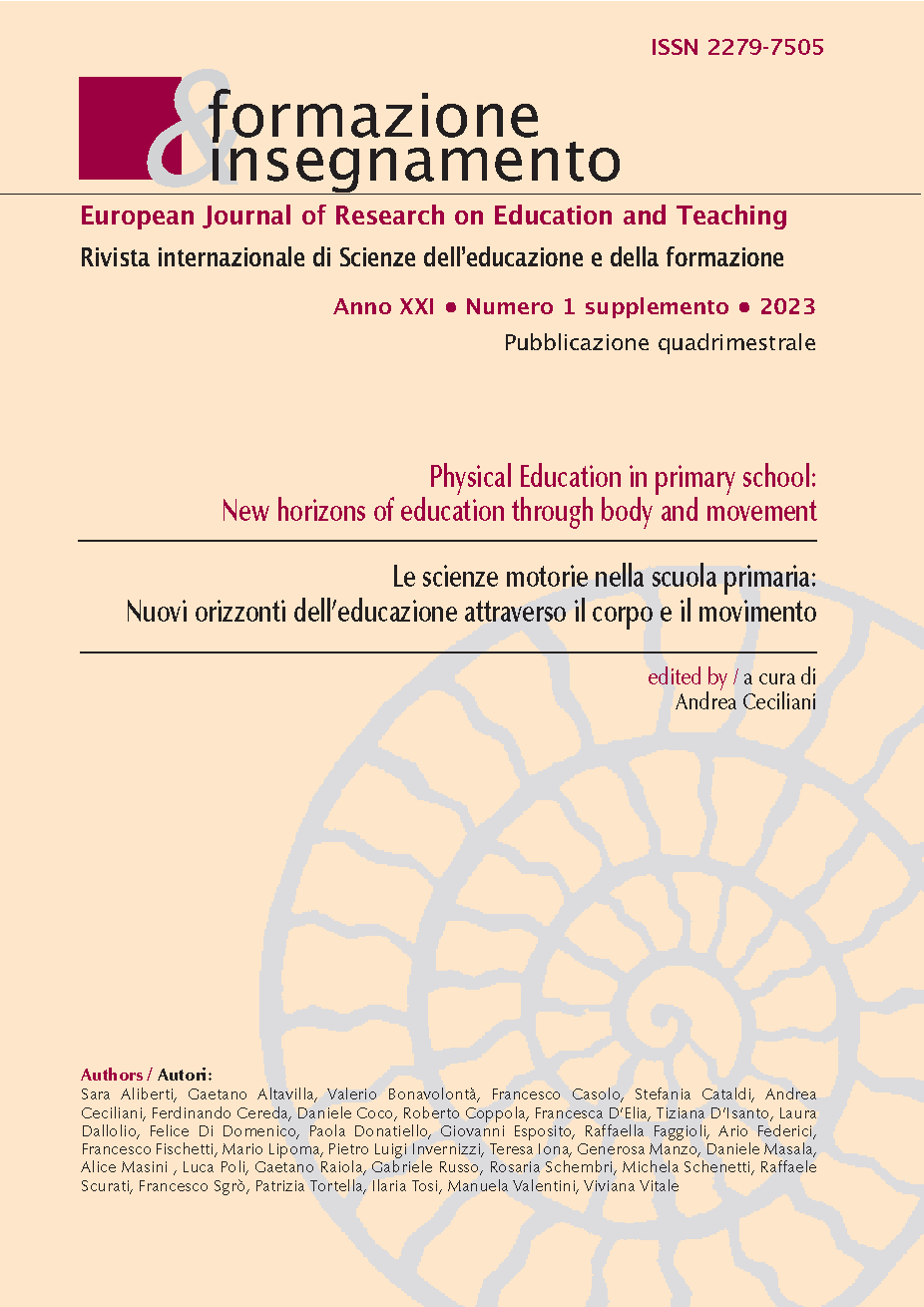Physical and sport education for life and soft skills development
DOI:
https://doi.org/10.7346/-feis-XXI-01-23_12Palavras-chave:
Motor competences, Physical activity, Motor-sports, Disciplinary and transversal objectives, Interdisciplinary goalsResumo
Physical education (PE) can be a useful tool to promote life/soft skills. Schools highlight the importance to combine the construction of knowledge with an education that provides students the means to face the challenges of daily life. In Italy, although life/soft skills are recognized as important competencies for the individual, there is no kind of ministerial decree about them. The purpose of the essay was to present a brief review of studies concerning the effectiveness of programs implemented during PE hours on development of life/soft skills, in order to decline new thematic cores that take into consideration the emerging results. The method was the literature review. From the studies identified, PE was found to be a discipline that can promote the development of life skills. It would be useful to update the National Directions, which declines the goals for the development of PE competencies and learning objectives.
Referências
Bailey, R., Armour, K. Kirk, D., Jess, M. Pickup, I., Sandford, R., & BERA Physical Education and Sport Pedagogy Special Interest Group. (2009). The educational benefits claimed for physical education and school sport: an academic review. Research Papers in Education, 24(1), 1–27. https://doi.org/10.1080/02671520701809817
Camiré, M., Trudel, P., & Bernard, D. (2013). A case study of a high school sport program designed to teach athletes life skills and values. The Sport Psychologist, 27(2), 188–200. https://doi.org/10.1123/tsp.27.2.188
CIIP. Conferenza intercantonale dell’istruzione pubblica della Svizzera romanda e del Ticino. (2003). Dimensioni del piano di studio. In CIIP (Ed.), Piano di studio delle competenze trasversali. Art 1 e 2 (pp. 19–22). https://scuolalab.edu.ti.ch/temieprogetti/pds/Documents/Parte_introduttiva/Dimensioni_del_Piano_di_studio.pdf
Cronin, L.D., Allen, J., Mulvenna, C., & Russell, P. (2018) An Investigation of the Relationships Between the Teaching Climate, Students' Perceived Life Skills Development and Well-Being Within Physical Education. Physical Education and Sport Pedagogy, 23(2), 181–196. https://doi.org/10.1080/17408989.2017.1371684
D’Elia, F. (2020). Teachers’ perspectives about contents and learning aim of physical education in Italian primary school. Journal of Human Sport and Exercise, 15(2proc), S279–S288. https://doi.org/10.14198/jhse.2020.15.Proc2.19
D’Isanto, T., Di Domenico, F., Aliberti, S., D’Elia, F., & Raiola, G. (2022). Criticisms and perspectives of heuristic learning in physical education. Pedagogy of Physical Culture and Sports, 26(2), 93–100. https://doi.org/10.15561/26649837.2022.0203
Duz, S., & Aslan, T. V. (2020). The effect of sport on life skills in high school students. Asian Journal of Education and Training, 6(2), 161–168. https://doi.org/10.20448/journal.522.2020.62.161.168
Goudas, M., & Giannoudis, G. (2010). A qualitative evaluation of a life-skills program in a physical education context. Hellenic Journal of Psychology, 7(3), 315–334. Retrieved January 31, 2023, from https://pseve.org/wp-content/uploads/2018/03/Volume07_Issue3_Goudas_Giannoudis.pdf
Goudas, M., Dermitzaki, I., Leondari, A., & Danish, S. (2006). The effectiveness of teaching a life skills program in a physical education context. European Journal of Psychology of Education, 21(4), 429–438. Retrieved January 31, 2023, from https://www.jstor.org/stable/23421391
Gül, Ö., Çaglayan, H. S., & Akandere, M. (2017). The effect of sports on the psychological well-being levels of high school students. Journal of Education and Training Studies, 5(5), 72–80. https://doi.org/10.11114/jets.v5i5.2270
Gülay, O., Mirzeoğlu, D., & Çelebi, M. (2010). Effects of cooperative games on social skill levels and attitudes toward physical education. Eurasian Journal of Educational Research, 10(40), 77–92. Retrieved January 31, 2023, from https://app.trdizin.gov.tr/makale/TVRBNE9USTRPQT09
Ministero del Lavoro e delle Politiche Sociali. (2021). Decreto 14 dicembre 2021: Adozione del Piano nazionale nuove competenze. (21A07649). Gazzetta Ufficiale Serie Generale, 162(307). https://www.gazzettaufficiale.it/eli/id/2021/12/28/21A07649/sg
MIUR. Ministero dell’Istruzione, dell’Università e della Ricerca. (2012). Indicazioni Nazionali per il curricolo della scuola dell’infanzia e del primo ciclo d’istruzione. Annali della Pubblica Istruzione. http://www.comune.torino.it/centromultimediale/01c_I_documenti_pedagogici/documenti_Nazionali_pdf/2012_Indicazioni_Curricolo_Sc_Inf.pdf
OMS. (1994). Division of Mental Health: Life skills education for children and adolescents in schools: introduction and guidelines to facilitate the development and implementation of life skills programmes. World Health Organization. Retrieved January 31, 2023, from https://apps.who.int/iris/bitstream/handle/10665/59117/WHO_MNH_PSF_93.7B_Rev.1.pdf
OMS. (2003). Skills for health: skills-based health education including life skills: an important component of a child-friendly/health-promoting school. World Health Organization. Retrieved January 31, 2023, from https://apps.who.int/iris/handle/10665/42818
OMS. (2020). Assessing national capacity for the prevention and control of noncommunicable diseases: report of the 2019 global survey. World Health Organization. Retrieved January 31, 2023, from https://apps.who.int/iris/bitstream/handle/10665/331452/9789240002319-eng.pdf
Opstoel, K., Chapelle, L., Prins, F. J., De Meester, A., Haerens, L., van Tartwijk, J., & De Martelaer, K. (2020). Personal and social development in physical education and sports: A review study. European Physical Education Review, 26(4), 797–813. https://doi.org/10.1177/1356336X19882054
Paron, E. (2020). Il ruolo delle life skills nel contesto scolastico attuale [Master’s Dissertation]. Università Ca’ Foscari, Venezia: Dipartimento di Studi Linguistici e Culturali Comparati. http://hdl.handle.net/10579/17000
Pesce, C., Marchetti, R., Motta, A., & Bellucci, M. (Eds.). (2015). Joy of moving. MoviMenti & ImmaginAzione. Giocare con la variabilità per promuovere lo sviluppo motorio, cognitivo e del cittadino. Perugia: Calzetti & Mariucci.
Pesce, C., Marchetti, R., Forte, R., Crova, C., Scatigna, M., Goudas, M., & Danish, S. J. (2016). Youth life skills training: Exploring outcomes and mediating mechanisms of a group-randomized trial in physical education. Sport, Exercise, and Performance Psychology, 5(3), 232–246. https://doi.org/10.1037/spy0000060
Presidente della Repubblica. (1999). Decreto del Presidente Della Repubblica 8 marzo 1999, n. 275: Regolamento recante norme in materia di autonomia delle istituzioni scolastiche, ai sensi dell'art. 21 della legge 15 marzo 1997, n. 59. Gazzetta Ufficiale Supplemento Ordinario, 152/L. Retrieved January 31, 2023, from https://www.gazzettaufficiale.it/eli/id/1999/08/10/099G0339/sg
SIRD. Società Italiana di Ricerca Didattica. (2022). Convegno nazionale Ricerca didattica e formazione insegnanti per lo sviluppo delle soft skills. Retrieved January 31, 2023, from https://www.sird.it/osservatorio-soft-skills/
Downloads
Publicado
Como Citar
Edição
Seção
Licença
Copyright (c) 2023 Sara Aliberti, Generosa Manzo

Este trabalho está licenciado sob uma licença Creative Commons Attribution 4.0 International License.
Formazione & insegnamento é distribuído sob a Attribution 4.0 International (CC BY 4.0).
Para obter mais detalhes, consulte nossa Política de Repositório e Arquivamento, bem como nossos Termos de Direitos Autorais e Licenciamento.





